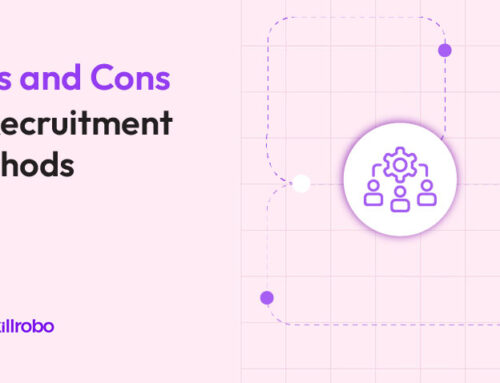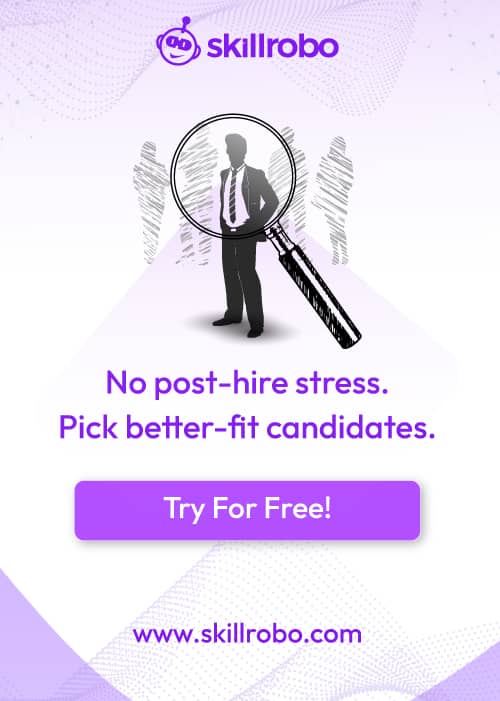Table of Contents
Related articles

A Bureau of Labor Statistics reveals that at the end of June 2019 there were 7.3 million job openings, from here the job openings have increased significantly. This increasing demand coupled with the COVID-19 pandemic induces recruitment challenges have created an enormous demand for advanced recruitment platforms to streamline the processes. The main drivers of the Global Online market are the expanded use of cloud-based technologies and the expansion of social networking. These technologies improve the efficiency of recruitment processes like resume management, pre-employment screening, assessment tools, etc.
Despite the availability of advanced recruitment technology platforms, there are some hard-to-fill positions in the recruitment bucket. What are hard-to-fill jobs and why is it tough to recruit people for these positions? Read on to know.
What are Hard-to-fill Jobs?
Ideally, employers and recruiters want to fill all open positions in the organization with the best talent available. Recruiting for highly technical or niche skill requirements can be a challenge for the recruitment team. Hard-to-fill job positions, as the name reveals, are challenging for the recruitment team to find the right fit. These positions run across industries, from financial advisors to cyber security specialists to managerial positions in the food and beverage industry. Pandemic situations or normal situations, these positions are always hard to fill for the recruitment team.
Recruiting for such challenging positions requires a different and fresh recruitment strategy. The use of online pre-employment skills testing software saves the recruitment team valuable time screening candidates for these hard-to-fill positions. The time saved by the use of such tools can be utilized to fill the position more efficiently and quickly.
Why are Certain Jobs Hard to Fill?
Hard-to-fill positions could be a nightmare for recruiters. What is it about these positions that make them tricky to fill?
Some of the reasons why certain positions are difficult to recruit candidates:
- The job is in high demand, but with a limited candidate availability with that skill set in the talent pool. A Compensation Best Practices Report by Payscale reveals that 78% of the respondent recruiters have unfulfilled positions due to scarcity of qualified candidates.
- Compensation decided for the role is too low due to which recruiters are unable to offer competitive pay to attract candidates.
- Job attributes like physical location, workplace, or coverage area are not appealing to the candidates.
- Company culture was difficult to match.
- The job description was too narrow overly specific or too broad to find a match.
- Weak employer branding or positioning.
Although these positions are difficult to source and fill, the recruitment team can successfully fill them with a solid strategy.
10 Effective Tips to Recruit for Hard to fill Positions
Challenging job positions can be filled with the right strategy and effort in the right direction. The recruitment strategy must be woven around the reasons that make the position challenging to fill.
Here are 7 effective tips that can help recruiters fill challenging job positions:
1) Tap social media networks:
Social media can be used as a powerful tool in attracting talent for challenging job positions. Posting the job description through compelling Facebook posts, LinkedIn messages, Instagram posts, and Twitter handles increases the reach of the job post significantly.
2) Cross-train existing team and look for talent within:
Some of the positions that are challenging to fill are newly emerging ones in your industry. Job openings that have been in the market for short durations are going to be difficult to source externally. Looking within the internal resource pool and cross-training existing teams with the required skills is more effective in filling newly opened positions. Cross-training must be made a part of the people’s strategy of the company.
3) Encourage employee referrals:
Employees of the company have a better understanding of the job requirements than anyone else. Opening niche or demanding job requirements to employee referrals is an effective way to attract potential candidates.
4) Revise job descriptions:
very often job descriptions are too broad narrow or overly specific, which results in poor responses from candidates. Revising the job description for hard-to-fill positions may improve responses from candidates.
5) Focus on college recruitment:
training freshers is sometimes easier than training an experienced person. Newly opened job positions may require skills that are project-specific. It is easy and quick to train college recruits on the skill set.
6) Build and promote a solid employment brand:
An unimpressive brand image of your company could be a roadblock in hiring for challenging positions. Recruiters need to teach hiring managers to think and speak in a way that paints an attractive image of their brand to potential candidates. Opening a job to the market must be done based on a launch strategy. The launch strategy must be comprehensive and deliberate.
7) Provide competitive compensation and benefits package:
Just as a poorly framed job description fails to attract potential candidates, a low compensation and benefits package can have the same effect in attracting talent. Revise the compensation and benefits so that they are competitive enough to attract candidates for filling highly demanding job positions.
8) Maintain a career portal:
recruiting only when there is a requirement is a beaten hiring strategy. To stay competitive, companies have to keep potential hires engaged at all times. Maintaining a career portal on the company’s website is a highly effective way of keeping candidates engaged. Fulfilling future requirements is greatly simplified when you build a talent pool.
9) Simplify the application process:
The long and cumbersome job application process dissuades potential candidates from applying for the position. Keeping the application simple makes it easy to apply and builds a positive brand image.
10) Leverage technology:
using advanced recruitment methods like online pre-employment skills testing software streamlines and optimizes the recruitment process. Saves a lot of effort and time for the recruitment team to screen and evaluate candidates for hard-to-fill positions.
Skillrobo is a pre-employment assessment tool that helps recruiters screen candidates effectively and quickly. Recruitment teams can use Skillrobo to hire skilled candidates for niche and highly demanding job positions. With our software, you can generate competitive tests for a variety of skills spanning industries and view analytic reports on candidate performance instantly.
Conclusion
The recruitment team must devise a strategy that combines traditional recruiting techniques with modern methods that leverage technology to tap into employee networks and build online strategies. Using pre-employment assessment tools is one of the most effective and foolproof methods to screen candidates for any type of skill requirement. Online pre-employment skill testing software like Skillrobo transforms the recruitment process. Save recruitment time and costs significantly with Skillrobo.
Sign up for a free trial to experience Skillrobo.

A Bureau of Labor Statistics reveals that at the end of June 2019 there were 7.3 million job openings, from here the job openings have increased significantly. This increasing demand coupled with the COVID-19 pandemic induces recruitment challenges have created an enormous demand for advanced recruitment platforms to streamline the processes. The main drivers of the Global Online market are the expanded use of cloud-based technologies and the expansion of social networking. These technologies improve the efficiency of recruitment processes like resume management, pre-employment screening, assessment tools, etc.
Despite the availability of advanced recruitment technology platforms, there are some hard-to-fill positions in the recruitment bucket. What are hard-to-fill jobs and why is it tough to recruit people for these positions? Read on to know.
What are Hard-to-fill Jobs?
Ideally, employers and recruiters want to fill all open positions in the organization with the best talent available. Recruiting for highly technical or niche skill requirements can be a challenge for the recruitment team. Hard-to-fill job positions, as the name reveals, are challenging for the recruitment team to find the right fit. These positions run across industries, from financial advisors to cyber security specialists to managerial positions in the food and beverage industry. Pandemic situations or normal situations, these positions are always hard to fill for the recruitment team.
Recruiting for such challenging positions requires a different and fresh recruitment strategy. The use of online pre-employment skills testing software saves the recruitment team valuable time screening candidates for these hard-to-fill positions. The time saved by the use of such tools can be utilized to fill the position more efficiently and quickly.
Why are Certain Jobs Hard to Fill?
Hard-to-fill positions could be a nightmare for recruiters. What is it about these positions that make them tricky to fill?
Some of the reasons why certain positions are difficult to recruit candidates:
- The job is in high demand, but with a limited candidate availability with that skill set in the talent pool. A Compensation Best Practices Report by Payscale reveals that 78% of the respondent recruiters have unfulfilled positions due to scarcity of qualified candidates.
- Compensation decided for the role is too low due to which recruiters are unable to offer competitive pay to attract candidates.
- Job attributes like physical location, workplace, or coverage area are not appealing to the candidates.
- Company culture was difficult to match.
- The job description was too narrow overly specific or too broad to find a match.
- Weak employer branding or positioning.
Although these positions are difficult to source and fill, the recruitment team can successfully fill them with a solid strategy.
10 Effective Tips to Recruit for Hard to fill Positions
Challenging job positions can be filled with the right strategy and effort in the right direction. The recruitment strategy must be woven around the reasons that make the position challenging to fill.
Here are 7 effective tips that can help recruiters fill challenging job positions:
1) Tap social media networks:
Social media can be used as a powerful tool in attracting talent for challenging job positions. Posting the job description through compelling Facebook posts, LinkedIn messages, Instagram posts, and Twitter handles increases the reach of the job post significantly.
2) Cross-train existing team and look for talent within:
Some of the positions that are challenging to fill are newly emerging ones in your industry. Job openings that have been in the market for short durations are going to be difficult to source externally. Looking within the internal resource pool and cross-training existing teams with the required skills is more effective in filling newly opened positions. Cross-training must be made a part of the people’s strategy of the company.
3) Encourage employee referrals:
Employees of the company have a better understanding of the job requirements than anyone else. Opening niche or demanding job requirements to employee referrals is an effective way to attract potential candidates.
4) Revise job descriptions:
very often job descriptions are too broad narrow or overly specific, which results in poor responses from candidates. Revising the job description for hard-to-fill positions may improve responses from candidates.
5) Focus on college recruitment:
training freshers is sometimes easier than training an experienced person. Newly opened job positions may require skills that are project-specific. It is easy and quick to train college recruits on the skill set.
6) Build and promote a solid employment brand:
An unimpressive brand image of your company could be a roadblock in hiring for challenging positions. Recruiters need to teach hiring managers to think and speak in a way that paints an attractive image of their brand to potential candidates. Opening a job to the market must be done based on a launch strategy. The launch strategy must be comprehensive and deliberate.
7) Provide competitive compensation and benefits package:
Just as a poorly framed job description fails to attract potential candidates, a low compensation and benefits package can have the same effect in attracting talent. Revise the compensation and benefits so that they are competitive enough to attract candidates for filling highly demanding job positions.
8) Maintain a career portal:
recruiting only when there is a requirement is a beaten hiring strategy. To stay competitive, companies have to keep potential hires engaged at all times. Maintaining a career portal on the company’s website is a highly effective way of keeping candidates engaged. Fulfilling future requirements is greatly simplified when you build a talent pool.
9) Simplify the application process:
The long and cumbersome job application process dissuades potential candidates from applying for the position. Keeping the application simple makes it easy to apply and builds a positive brand image.
10) Leverage technology:
using advanced recruitment methods like online pre-employment skills testing software streamlines and optimizes the recruitment process. Saves a lot of effort and time for the recruitment team to screen and evaluate candidates for hard-to-fill positions.
Skillrobo is a pre-employment assessment tool that helps recruiters screen candidates effectively and quickly. Recruitment teams can use Skillrobo to hire skilled candidates for niche and highly demanding job positions. With our software, you can generate competitive tests for a variety of skills spanning industries and view analytic reports on candidate performance instantly.
Conclusion
The recruitment team must devise a strategy that combines traditional recruiting techniques with modern methods that leverage technology to tap into employee networks and build online strategies. Using pre-employment assessment tools is one of the most effective and foolproof methods to screen candidates for any type of skill requirement. Online pre-employment skill testing software like Skillrobo transforms the recruitment process. Save recruitment time and costs significantly with Skillrobo.
Sign up for a free trial to experience Skillrobo.








